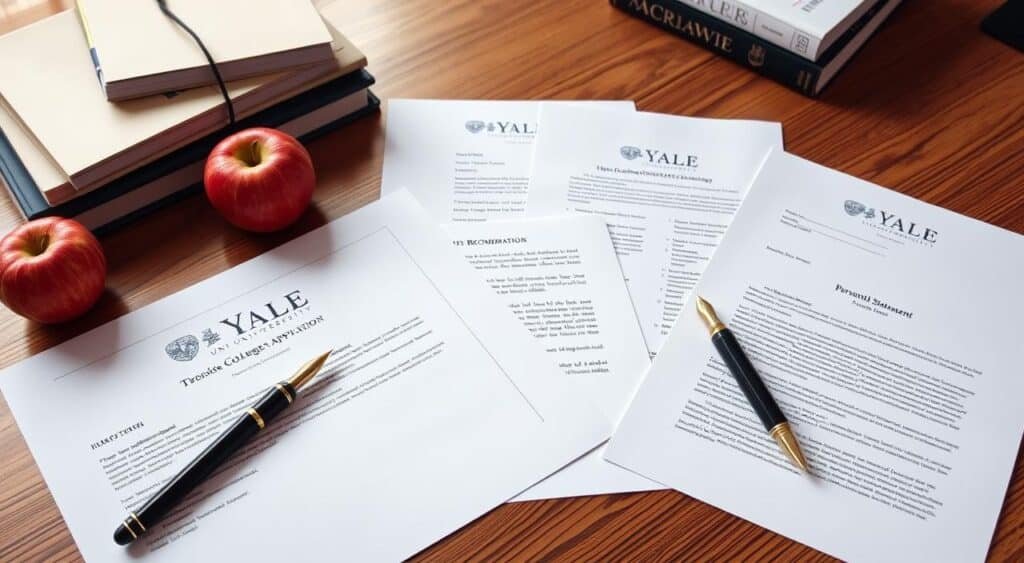Yale University was founded in 1701 in New Haven, Connecticut. It’s one of the oldest and most respected Ivy League schools worldwide. The admissions process at Yale is very competitive, with only a 4% acceptance rate in 2023. Students from all over the world apply, hoping to join Yale’s rich academic tradition.
Yale’s admissions team looks at each applicant as a whole. They consider more than just grades and test scores. With so many talented students applying, it’s key for applicants to show how they fit Yale’s goals and values.
Key Takeaways
- Yale University’s overall acceptance rate was just 4% in 2023, making it one of the most selective Ivy League schools.
- The university receives applications from a large pool of highly qualified students, creating a highly competitive admissions landscape.
- Yale evaluates applicants holistically, considering factors beyond just grades and test scores.
- Applicants must differentiate themselves and demonstrate alignment with Yale’s priorities to stand out in the admissions process.
- Gaining admission to Yale University is an impressive achievement, reflecting the institution’s exceptional academic standards and prestige.
Yale University’s Current Acceptance Rates and Statistics
Yale University is a top school in the U.S., with an acceptance rate around 4% in recent years. The yale acceptance rate for the Class of 2028 was 3.73%, a slight drop from 4.35% the year before. This shows Yale’s high standards and selective admissions.
Early Action vs. Regular Decision Statistics
The early action program at Yale has a 9.02% acceptance rate for the Class of 2028. In contrast, the regular decision rate was just 2.75%. This highlights the early action program’s value for students.
Class Profile Demographics
Yale values diversity, as seen in its class profile demographics. The Class of 2026 had 49% men and 51% women. It also had 27% Asian American, 13% African-American or Black, 14% Latinx, and 3% Native American or Pacific Islander students. Plus, 18% were first-generation college students.
Yale received 52,250 applications for the Class of 2026, a record. This shows the huge applicant pool and how competitive admissions are. Yet, Yale’s fame and academic quality draw diverse, talented students worldwide.
| Statistic | Value |
|---|---|
| Yale College acceptance rate | 4.5% |
| Percentage of first-years that return for their sophomore year | 99% |
| Percentage of undergraduates living in university housing | 80% |
| Percentage of undergraduates graduating within six years | 98% |
| Percentage of out-of-state (including international) undergraduates | 94% |
Academic Requirements and Standards at Yale University

Students aiming for Yale University face tough competition. The school demands top-notch intellect and academic success from applicants.
GPA and Class Rank Expectations
Yale values academic achievement highly. It looks for students with a GPA near 4.0. Most admitted students are in the top 10% of their class.
Standardized Test Score Requirements
Test scores are crucial for Yale. In 2020, most admitted students scored between 1480 and 1580 on the SAT. ACT scores were between 33 and 35. Starting in 2024, Yale will again require test scores.
Course Rigor and Academic Excellence
Yale prizes academic excellence and challenging courses. It wants students to take the toughest classes at their high school. This shows they can handle Yale’s rigorous academics.
| Requirement | Details |
|---|---|
| GPA | Unweighted GPA close to 4.0 |
| Class Rank | 97% of admitted students in the top 10% of their high school class |
| SAT Scores | Middle 50% range: 1480-1580 |
| ACT Scores | Middle 50% range: 33-35 |
| Course Rigor | Challenging coursework, including the most advanced classes available |
At Yale, your high school transcript is key. It shows your grades and course choices. High grades and challenging classes prove you’re ready for Yale’s academics.
The Essential Components of a Yale Application

The Yale application process is detailed, needing many parts to show an applicant’s skills, activities, and character. It includes the common application or coalition application, supplemental essays, letters of recommendation, and school reports. Each part is key to Yale’s thorough review.
Students can apply through the Coalition Application with Yale questions, the Common Application with Yale questions, or the QuestBridge Application with Yale’s QuestBridge Questionnaire. Yale doesn’t favor any application method.
Applicants must pay an $80 application fee, but it can be waived if they show financial need. They also need two teacher recommendations and one counselor recommendation. Plus, an official high school transcript and a mid-year report with current grades.
Standardized test scores, like the ACT, AP, IB, or SAT, are also needed. Yet, Yale looks at these scores as part of the whole application. There’s no minimum score needed for admission.
Applicants can also submit extra materials, like interviews and more information. These optional parts help Yale understand each applicant better.
In summary, the Yale application is complex, needing many different materials. These materials show an applicant’s academic success, leadership, and personal traits. By carefully preparing each part, students can boost their chances of getting into Yale.
What Makes Yale University’s Admissions Process Unique

Yale University’s admissions process is special because it looks at each applicant in a unique way. It has a Single-Choice Early Action program. This lets students apply early without having to commit if they get in. It’s a chance to get an early decision while still keeping options open.
Yale also uses a holistic review process. It looks at more than just grades. The university wants to know who will benefit most from Yale and who will make a big impact. It’s all about finding students who will make a difference and lead.
Recently, Yale made some policy changes. Starting in 2024, students will have to send in their test scores. Yale also updated its policies to keep admissions fair and open to everyone.
In short, Yale’s admissions aim to find the best in each applicant. It looks beyond grades to find a diverse and talented group of students. This way, Yale can offer a unique and enriching experience to all its students.
Also Read: What Are The Different Types of Scholarships?
Conclusion
Yale University’s admissions are among the toughest in the country. Only about 5% of applicants get in. Those who do have top grades, amazing extracurriculars, and stories that show their unique talents and goals.
The university looks for students who will use its many resources well. They want those who are curious, open to new ideas, and eager to join a community of leaders. This community aims to make a positive difference in the world.
Getting into Yale is hard, but it’s worth it. Once in, students join a network of accomplished alumni. They are ready to make big impacts in their careers and beyond. Yale’s tough admissions keep it a top place for learning, innovation, and change.
FAQs
Q: How competitive is the admissions process at Yale University for Yale College?
A: The admissions process at Yale College is highly competitive, with acceptance rates typically around 5-7%. Yale seeks to admit students who demonstrate exceptional academic performance, leadership skills, and a commitment to community service.
Q: What is the significance of the Class of 2025 in Yale’s admissions history?
A: The Class of 2025 at Yale University has set records for both the number of applications received and the diversity of the applicant pool. This reflects Yale’s commitment to attracting talented individuals from various backgrounds and experiences.
Q: Can you explain the role of extracurricular activities in the admissions process at Yale University?
A: Extracurricular activities, such as participation in athletics, arts, and community service, are important factors in Yale’s admissions process. The university values well-rounded students who have made significant contributions outside of their academic pursuits.
Q: What types of scholarships are available for undergraduate students at Yale?
A: Yale University offers a range of scholarships based on financial need, as well as merit-based scholarships for exceptional students. Financial aid programs ensure that all admitted students can afford to attend, regardless of their economic background.
Q: How does campus life at Yale contribute to the overall student experience?
A: Campus life at Yale is vibrant and diverse, with numerous residential colleges, cultural events, and student organizations. This dynamic environment fosters personal growth, academic collaboration, and lifelong friendships among Yale undergraduates.
Q: What opportunities does the Yale graduate school of arts provide for students?
A: The Yale Graduate School of Arts offers advanced study and research opportunities across various disciplines, including humanities and social sciences. Students engage with distinguished faculty and benefit from Yale’s extensive resources, including the Sterling Memorial Library.
Q: Are there specific programs at the Yale Graduate School that focus on the arts?
A: Yes, Yale offers specialized programs in the School of Drama, School of Music, and School of Art, allowing students to pursue their passions in performing and visual arts while benefiting from Yale’s exceptional faculty and facilities.
Q: How does Yale’s athletic program impact student life for student athletes?
A: Student athletes at Yale balance their academic responsibilities with competitive sports, contributing to campus life by promoting school spirit and teamwork. The Yale Bulldogs have a rich tradition in athletics, enhancing the overall experience for all students.
Q: What is the importance of the Peabody Museum and other galleries in Yale’s academic landscape?
A: The Peabody Museum and various galleries at Yale play a crucial role in research and education, providing hands-on learning experiences for students across disciplines. These resources enhance the study of anthropology, art history, and natural sciences.
Source Links
- https://www.sparkadmissions.com/blog/yale-acceptance-rate/
- https://www.crimsoneducation.org/us/blog/yale-acceptance-rate/
- https://www.yale.edu/about-yale/yale-facts
- https://toptieradmissions.com/yale-acceptance-rate/
- https://catalog.yale.edu/ycps/academic-regulations/requirements-for-ba-bs-degree/
- https://catalog.yale.edu/undergraduate-regulations/
- https://admissions.yale.edu/standardized-testing
- https://admissions.yale.edu/instructions
- https://rostrumedu.com/components-of-a-yale-application/
- https://www.ivywise.com/blog/applying-to-yale-heres-what-you-need-to-know/
- https://www.crimsoneducation.org/ca/blog/how-to-get-into-yale/
- https://poorvucenter.yale.edu/sites/default/files/basic-page-supplementary-materials-files/conclusion_analysis.pdf
- https://www.collegeadvisor.com/essay-guides/why-yale-essay-examples/
- https://www.thomascaleel.com/podcast/season-2-episode27-college-admissions-and-the-applicant-portal-what-is-it-5bayp-cpxt9-te762-hyeyn-hbedc-bnssf-jpws8-9p5st-wladc-4wa8n-a72rx-2xjj4-k9t6b-2wcgj






